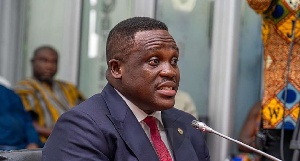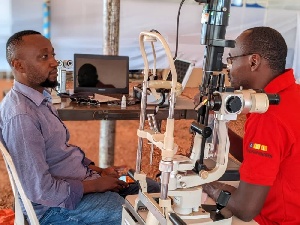- Home - News
- Elections 2024
- News Archive
- Crime & Punishment
- Politics
- Regional
- Editorial
- Health
- Ghanaians Abroad
- Tabloid
- Africa
- Religion
- Photo Archives
- Press Release
General News of Wednesday, 4 June 2025
Source: www.ghanawebbers.com
Sam George outlines evidence-based plan to reduce mobile data costs
The Minister for Communications and Digitalisation, Sam Nartey George, has announced a new plan. This roadmap aims to reduce mobile data costs in Ghana. It also focuses on maintaining service quality and value for consumers.
In an interview with the Ghana News Agency, Mr. George discussed high data prices. He acknowledged that these prices strain citizens financially. While some regional comparisons show Ghana's data is affordable, he noted the reality is different.
Currently, 1GB of mobile data costs about GHS17 ($1.37). This price is nearly equal to Ghana’s daily minimum wage of GHS19.97 ($1.61). Mr. George called this situation “unsustainable.” He believes it threatens access to digital services for everyone.
To address this issue, the government formed a 23-member inter-agency committee on data pricing. After two weeks of discussions, they created a comprehensive roadmap for government policy.
Mr. George emphasized that this plan is structured in stages. Unlike previous initiatives that failed due to poor execution, this one aims to ensure affordability without sacrificing user experience.
He raised an important question: If network A becomes more expensive, can network B provide the same quality? He stressed the need for investments in infrastructure across all providers.
The strategy is based on three key principles: price, quality, and value. Any future pricing changes must offer greater utility to users.
“Value means if you previously got 100GB for a certain price, you should get more later,” Mr. George explained.
He assured Ghanaians that they would soon see data packages offering “more gigabytes for less.” Telecommunications companies are encouraged to adjust their plans accordingly.
To promote transparency and global standards, a delegation from the International Telecommunication Union (ITU) is in Ghana now. They are conducting an independent assessment of the country’s data pricing model.
Mr. George emphasized that government actions will be based on research and verifiable data.
“We want our approach grounded in facts and international standards,” he stated.
Ultimately, the Communications Ministry views this initiative as essential for closing the digital divide. They aim to make high-speed internet affordable and accessible for every Ghanaian—regardless of income or location.











